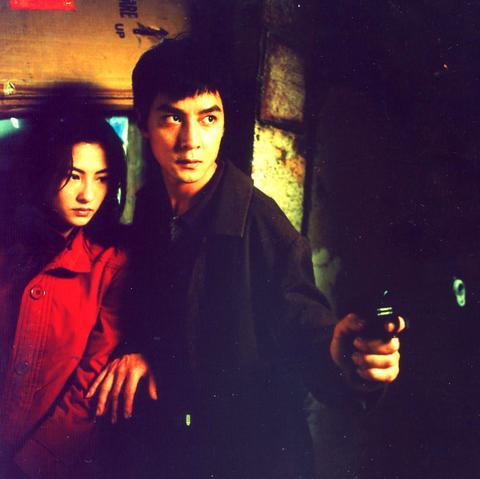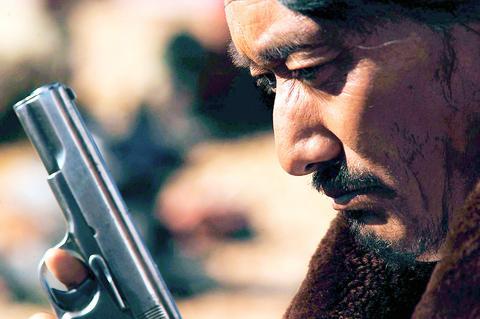★Breaking News (大事件)

Representing: Hong Kong, China

Directed by Johnny To (杜琪鋒)

A frequent visitor to the Golden Horse, Johnny To makes, on average, three films a year. Every year, at least one out of his three films gets nominated for Best Picture category at the Golden Horse. Last year it was PTU, the action film about the police and gangland mind games.
This year, it's Breaking News, another police crime movie but with the addition of a subplot about media manipulation. To was also nominated for Best Director for this film.

The film is a fast-paced affair with slick cinematography, though audiences may find it hard to follow some of the scenes. It begins with a TV news broadcast that an embarrassing defeat of a police battalion by five bank robbers has taken place.

The credibility of the police force drops and some 30,000 policemen are mobilized to patrol every possible exit route and city border.
While on a separate investigation in a run-down building, detective Heng (Nick Cheung,張家輝) discovers the hideout of the robbers.
Heng and his men enter the building and prepare to take their foes out, while, in order to beat the media at its own game, Inspector Rebecca (Kelly Chan, 陳慧琳) decides to turn the stakeout into a live broadcast show.
★The Moon Also Rises (月光下我記得)
Representing: Taiwan
Directed by Lin Cheng-sheng (林正盛)
This film is seen as one of the best works of Lin Cheng-sheng -- and perhaps for actress Yang Kui-mei (楊貴媚) as well. It is a movie that contains strong dramatic elements.
The film is adapted from novelist Li Ang's (李昂) novel of the same title. Set in the 1950s, the White Terror period, the film is filled with a suffocating atmosphere and strong repression of emotion.
The lead, Bao-tsai (Yang Kui-mei), lives in a comfy mansion on Tulan Mountain in Taitung. The house faces Green Island in the Pacific Ocean, where Bao-tsai's husband was detained as political prisoner.
Having divorced, the single mother lives with her teenage daughter and a loyal maid in an isolated house by the sunny seashore. While the mother tries hard to hide her trauma, her adolescent daughter has learned to liberate herself in love and freedom.
Maybe out of jealousy, or for some other reason, the mother begins to monitor the daughter's life and her brewing relationship with a young man from China. Until one day she meets the man in person.
★2046
Representing: Hong Kong
Directed by Wang Kar Wai (王家衛)
Continuing the story of In the Mood For Love, Wong Kar again presents a visually glamorous romantic drama. Rich in nostalgia, every character in the picture indulges in his or her own sentimental world.
The year was 1966. Chow Mo Wan (Tony Leung, 梁朝偉) returns to Hong Kong and has to confront a concealed past. He now has a Clark Gable-like mustache and is more slickly dressed. After experiencing the trauma of love, Chow has changed.
He has sealed his heart and is now a hedonistic writer, writing cheap erotic novels for a living, holding parties every night.
There are many women. He first meets an old acquaintance Lulu, who is later murdered by the jealous boyfriend. Then he has a game-like relationship with Bai Ling (Zhang Ziyi, 章子怡), a seductively charming woman. And then there is Jing-wen (Faye Wong, 王菲), who works hard to go to Japan to meet her boyfriend, despite her father's disapproval.
Soon he ends up writing a novel he calls 2046. In the story anyone taking the train bound for 2046 has the chance to retrieve their lost memories.
★Kekexili (可可西里)
Representing: China, Hong Kong
Directed by Lu Chuan (陸川)
Kekexili is a mysterious place that people yearn for. This is a movie about trust and life, it focuses on a human's living circumstances and his or her natural environment.
This is Lu Chuan's second feature film and a dark horse for this year's nominations. The story of the film is based on the true story of a journalist who joins a Tibetan volunteer patrol chasing a ring of poachers trading in antelope wool.
It is a road movie but most of the driving scenes are done off-road.
Doubujie is the leader of the patrol squad taking his team of Tibetan volunteers to catch the poachers. He catches some on the road, but he is determined to cross the snowy mountain and catch the gang leader.
The trouble is, the squad is out of fuel, food and bullets. And the squad members, as well as the suspects, have got mountain sickness.
Doubujie has to divide the group and send some of them back. But going back home is as dangerous as the route they are taking. There are snow storms, icy rivers and quicksand.
The scenery is stunningly beautiful but no one can stop to enjoy the beauty. And when the environment is so dangerous that everyone has to struggle just to stay alive, the wish to pursue justice gradually evaporates.
★One Nite in Mongkok (旺角黑夜)
Representing: Hong Kong
Directed by Tung-shing Yee (爾冬陞)
This film tries to look at the unique social problem and gang culture of Mongkok, where thousands of hoods congregate in an area of a few blocks. The majority of people here are emigrants from China. Women from China work as prostitutes, while men are hired to kill.
In Mongkok, there are two main triads and their leaders are Tim and Nine, respectively.
They they initiate a number of killings. Tim commissions Luk to hire "Rat" (a cross-border killer) to kill Nine. Rat (Daniel Wu, 吳彥祖) comes to Hong Kong not just to be a killer, but to look for his fiancee Sue. He cannot find Sue but instead encounters Cecila Cheung (張柏芝), a prostitute from his home town back in China.
Cheung shows Wu around Hong Kong and lets him see the good life of Hong Kong. But she also shows him the dark side.

May 26 to June 1 When the Qing Dynasty first took control over many parts of Taiwan in 1684, it roughly continued the Kingdom of Tungning’s administrative borders (see below), setting up one prefecture and three counties. The actual area of control covered today’s Chiayi, Tainan and Kaohsiung. The administrative center was in Taiwan Prefecture, in today’s Tainan. But as Han settlement expanded and due to rebellions and other international incidents, the administrative units became more complex. By the time Taiwan became a province of the Qing in 1887, there were three prefectures, eleven counties, three subprefectures and one directly-administered prefecture, with

Taiwan Power Co (Taipower, 台電) and the New Taipei City Government in May last year agreed to allow the activation of a spent fuel storage facility for the Jinshan Nuclear Power Plant in Shihmen District (石門). The deal ended eleven years of legal wrangling. According to the Taipower announcement, the city government engaged in repeated delays, failing to approve water and soil conservation plans. Taipower said at the time that plans for another dry storage facility for the Guosheng Nuclear Power Plant in New Taipei City’s Wanli District (萬里) remained stuck in legal limbo. Later that year an agreement was reached

What does the Taiwan People’s Party (TPP) in the Huang Kuo-chang (黃國昌) era stand for? What sets it apart from their allies, the Chinese Nationalist Party (KMT)? With some shifts in tone and emphasis, the KMT’s stances have not changed significantly since the late 2000s and the era of former president Ma Ying-jeou (馬英九). The Democratic Progressive Party’s (DPP) current platform formed in the mid-2010s under the guidance of Tsai Ing-wen (蔡英文), and current President William Lai (賴清德) campaigned on continuity. Though their ideological stances may be a bit stale, they have the advantage of being broadly understood by the voters.

In a high-rise office building in Taipei’s government district, the primary agency for maintaining links to Thailand’s 108 Yunnan villages — which are home to a population of around 200,000 descendants of the Chinese Nationalist Party (KMT) armies stranded in Thailand following the Chinese Civil War — is the Overseas Community Affairs Council (OCAC). Established in China in 1926, the OCAC was born of a mandate to support Chinese education, culture and economic development in far flung Chinese diaspora communities, which, especially in southeast Asia, had underwritten the military insurgencies against the Qing Dynasty that led to the founding of